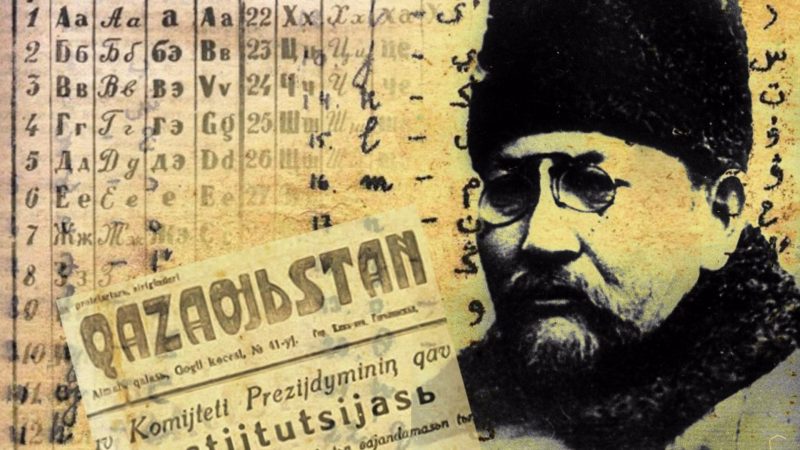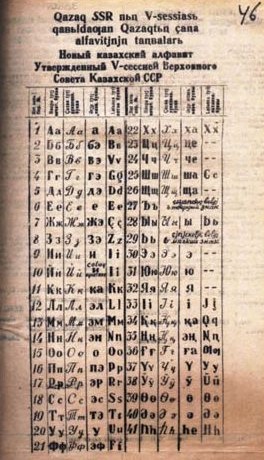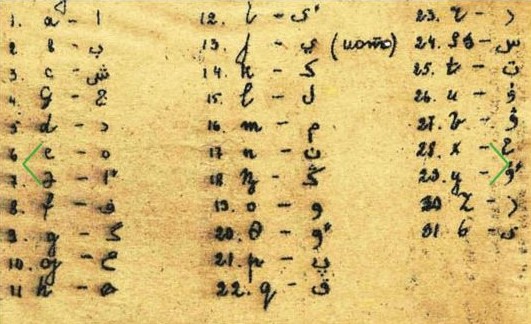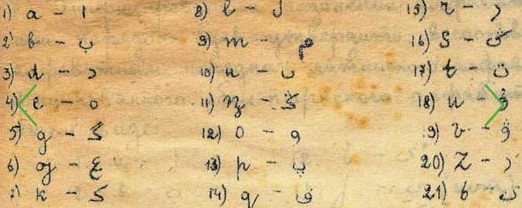
Switching to Latin

The transition to Latin is one of the most relevant topics for our country at the moment. I am not sure on what alphabet version we will stop now, and when our state will switch to Latin, but it is impossible to notice this situation. How to properly switch to Latin - the question is very complicated, so I do not accept any side, I just want to share with some of the speakers our language and Latin letters. On this topic I was inspired by my husband, moreover, he supported me, providing ideas and information. In the article we also offer your version of the Latin alphabet. Maybe somewhere in the higher instances we will accept our variant, but with the knowledge of English, Turkish, Kazakh, Russian languages we tried to come up with our own readable variant of the alphabet, since the developed version of the Latin alphabet creates chaos in the head, and there is a lot of controversy among the people.

First of all, for our people, Latin is not something new, but simply a return to the origins of the Kazakh language. Many know that almost a decade ago, Kazakh language, and more precisely, Kazakh writing was subjected to similar reforms. After the Arabic vows, the Kazakhs wrote in Latin. The Cyrillic alphabet was adopted in November 1940 by a decree of the Presidium of the Supreme Soviet of the Kazakh SSR. Then the new Kazakh alphabet was approved on the basis of Russian graphics, consisting of 41 letters (32 letters of the Russian alphabet and 9 letters for the designation of specific sounds of the Kazakh language).
On December 10, 1926, in the Red Horde, Ahmet Baitursynov announced at a discussion meeting that “The alphabet is neither bigger nor smaller. Less - just a set of conditional signs that serve to depict the basic sounds of a spoken language. The more and more accurately the elements of the alphabet transmit the speech, the easier it is for him to learn to read and write, the more comfortable he is for reading and writing, the better he is accustomed to technical improvements, the better he is considered.

Consequently, the alphabet is a subject that is quite amenable to consideration and definition of its quality from the side of advantages and disadvantages ... ". Let me remind you that we switched to the Latin alphabet later than all the Turkic-speaking countries, all thanks to the Arabic alphabet of Akhmet Baitursynov. After all, his thoughtful, competent, scientifically grounded alphabet, based on the Arabic script, conveyed well the phonetic features of the Kazakh language. Today, this alphabet is still used by many who live outside of Kazakhstan. For example, in Turkey and (whether) in China. Among the people, he was entrenched as "tte zhazu."
Despite the fact that Akhmet Baitursynov, a resident of Alash-Orda, calls the alphabet just an object, at that time he was an obvious opponent of the Latinization of the Kazakh language. Linguistic scientist Baitursynov said: “We, the Cossacks (“ Cossacks ”are given without correction), have long ago identified the main elements of our speech, designated them with appropriate signs, we write well, read well, learn to read and write much easier and faster than the Russians, Germans, French , British and others.
What else do we need? No, they say, we need to change our font to Latin, because our font is not ours - Arabic ... ". The experiences of the Kazakh linguist and literary critic were not in vain at that time. He believed that Western Latin does not suit 25-30% of the sound composition of the Turkic languages, and that the Latin language requires reform in order to adapt it to the sounds of the languages of the Turkic peoples. This meant: without new additional characters, not a single set of ready-made font would fit. (One typewriter cannot be used without making the appropriate changes. Now there are no typewriters, things are different with the computer).

It is clear that during the years of reforms, another language reform would have been very hard for the people to master. But be that as it may, after the Arabic script, we still adopted the Latin alphabet, and then the Cyrillic alphabet. Confirming the fears of literary scholars, the frequent reforms of our language led to the fact that the Kazakh people lost a lot of manuscripts and works of genius of the past centuries. It is worth noting that the 1920s and 1940s were very dramatic for our people. Many post-Soviet countries have gone through difficult times. This is what our great minds in the person of outstanding enlighteners feared.
But in the modern world, where we live in an independent state, in the world of globalization and cross-cultural phenomena, the transition to the Latin alphabet should be perceived quite differently. We must treat this process in an innovative way easily and simply, because young people already write in Latin without much effort, for them it is easier, faster and more effective.
But it's one thing to switch to the Latin alphabet, and another to compose a literate alphabet. With the different options that were offered to us, it was possible to break not only the tongue, but also the head. Those who know Turkish understand that it is very easy to read and write in the Latin alphabet, even easier than it seems. And then the curtain falls: we begin to understand that reading and writing Kazakh words in the Latin alphabet is difficult for two categories of people: the first category simply does not know Latin letters or does not speak English, most often these are elderly people. And the second category is those who do not speak their native language and do not know it!

In the first case, the problem is neither global nor categorical. The state is not going to switch to the Latin alphabet overnight. It will take years before we start writing in Latin. It will take at least 20 years to establish a new life for our language.
And with the second category, things are sad. After all, many over 20 years of independence, living in Kazakhstan, have not yet managed to learn their native language. The transition to the Latin alphabet can become very problematic for these people. And by the way, they are the most worried about our upcoming reform. There is also good news - maybe for this category of people the new format of the Kazakh language will seem more fashionable, due to its similarity to English.

Because young people still perceive Kazakh language as old-fashioned, outdated, anti-glamorous. Hence, the concept of "collective farmers". Maybe, reading Latin letters, our awfully cool youth will begin to appreciate their native language! Indeed, in reality, the Kazakh language is very rich and deep. In our language, you can find about a dozen words denoting the word "baby" (sәbi, bala, әldi, bөpe, shagalaқ, bөbek, baldyrғan, nәrest), and there are many such examples. Or take a look at the variation on the word "cow, bull":
Buzau - bir zhasқa deyingi tuli (cattle up to a year).
Torpak-tana - bir zhastan askan tuli (cattle after a year).
Baspaқ - kuzge qaraigy buzau (cattle from the autumn herd).
Kashar - bir zhastagy urgashy siyr (one-year-old female).
Khazhyn - eky zhastagy tol beretin siyr (two-year-old cow ready for fertilization).
Denezhin - tabynga tusken urgashy siyr (cow in the herd).
Best siyr - birneshe ret bazaulagan siyr (a cow that has already given birth to several calves).
Kenzhe tayinsha - zhas siyrdyn atauy (young cow)
Бasha - bir zhasqa erkin tolmagan taiynsha (almost one-year-old cattle).
Tayinsha bұқa - bir zhasar kezi (one-year-old cattle).
Dөnen bұқa - tabynғa tuskenine үsh zhyl bolgany (a bull that has been in the herd for three years already).
Onan bұқa - eki zhasar kezi (two-year-old bull).
The newly composed alphabet is somewhat difficult even for those who speak Kazakh and know English. Why use the principle of the English language (where one sound is transmitted in several letters when writing) when there is a previously invented alphabet, why complicate it when there are already prototypes of alphabets for Turkic-speaking countries?
Coming up with a new alphabet, I want to say: "The simpler, the better!" For example, the letter ''ә'' is a combination of letters such as ae. In fact, one could just do a with a dash (apostrophe) as à. If you know Kazakh well, jaña Qazaq árîpterîn oku qiyn emes.
Below, my spouse and I provide you with 12 points, noting what, in our opinion, should be taken into account when developing a new alphabet. Plus, we've put together our own alphabet to show how much easier we think it could be to approach.
• The issue of switching to the Latin alphabet concerns all native speakers and those who plan to speak it in the future.
• The current version, in my opinion, is the easiest in terms of using the keyboard layout in English. However, the Kazakh language is agglutinative. It will be difficult and time-consuming for native speakers to write words. As a vivid example, one of the longest words known to the majority, consisting of 33 letters: "қaнaғaттaндырылмағaндықтарыңыздан", in the official Latin spelling will consist of 36 letters: "qanaghattandyrylmaghandyqtaryngyzdan"
• For those who believe that the rich presence of sounds in our phonetics will disappear, I would like to say: do not forget that English and Russian are still studied in schools.
• For those who believe that umlaut (two dots above a letter), short (a check mark above a letter) and a hook (a comma merged with a letter) will be difficult to read, I want to say: let them not forget that they also exist in Russian (E, Y, Sch, Ts, b, (?) B)
• Umlaut, or colon, is a sound softening sign for letters such as (Ә, Ө, Ү, І)
• Three specific sounds will be transmitted in separate letters (Ғ - Ğ, Ң - Ŋ, Ұ - Ū).
• Five letters for new words will be transmitted by double spelling (Ф - PH, Ц - TS, Ч - CH, Ю - YU, Я - YA).
• Taking into account the non-use of three letters of the English layout (W, F, X), only four keys will be taken away from the punctuation marks. The row with numbers on the computer keyboard will not be used as it is now.
• This transition to the Latin alphabet is the development of the Kazakh language, it should be accompanied by the cleaning of the language from unnecessary words and incorrect borrowings. For example, remove the word “somke” and leave “dorba”, instead of space - garysh, batenke - kebis / mаsi, tapishke - sharke, problemalar - maseleler, etc.
• Other words taken from the Turkic language became borrowed back, and even with mistakes, for example, "pencil" became the word "karyndash". Such words must be brought back to their original form, that is, qaratas. Staqan - tostagan, etc.
• Get rid of borrowed words that were once also borrowed and use original words. For example, the word "orange" was borrowed from German or Dutch, and it means "Chinese apple". The original name will be spelled "naran". Likewise, the word "potato", which entered the Russian language from German, takes its roots from the word "truffle". It was adopted due to the fact that the words are similar in sound. The original name of the potato is patata.
• We are the ones who will write and read using the new (given) alphabet. In my opinion with my spouse, the option proposed here will be easier to perceive and write than doubling letters to convey basic sounds.
1.https://tengrinews.kz/article/639/ 2.https: //kk.wikipedia.org/wiki/Siyr_malynyң_ataularas
Author: Madina Kurbanalieva, @madina_kurbanali
Photo: ANTIKA gallery archives